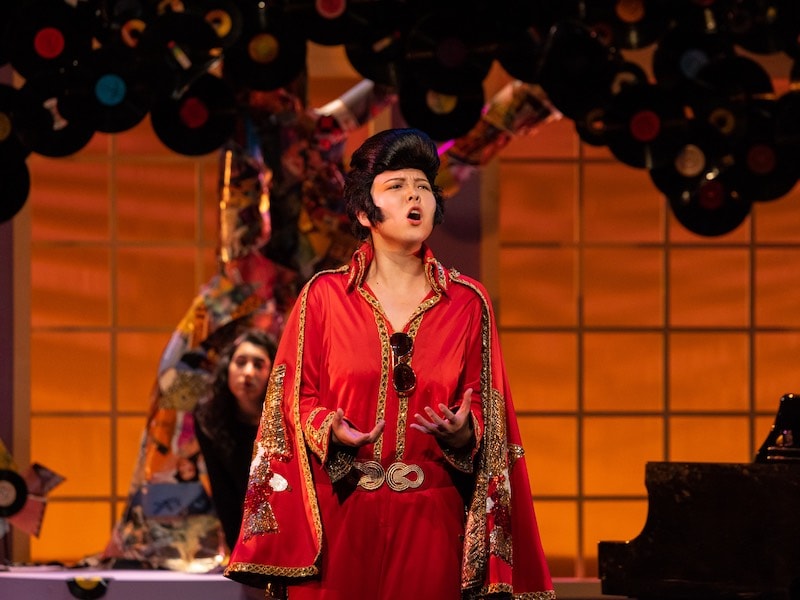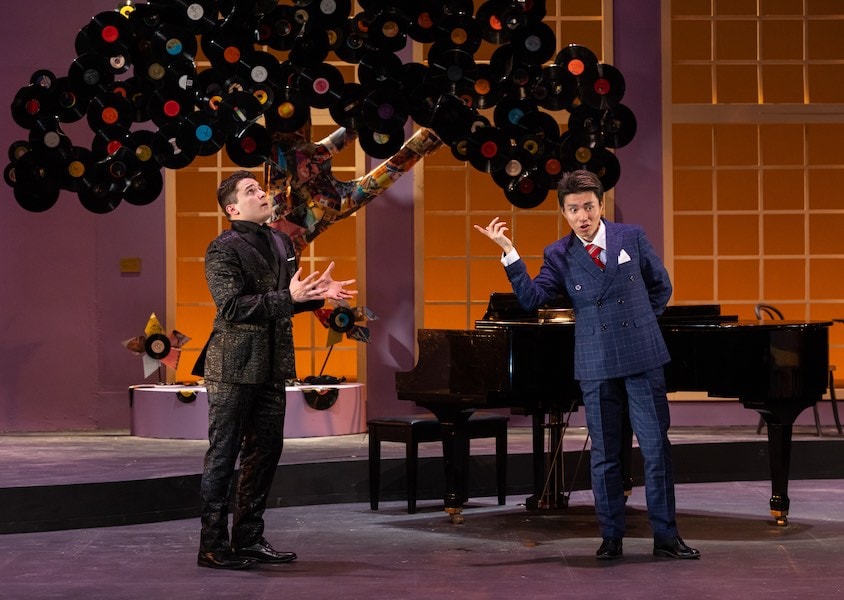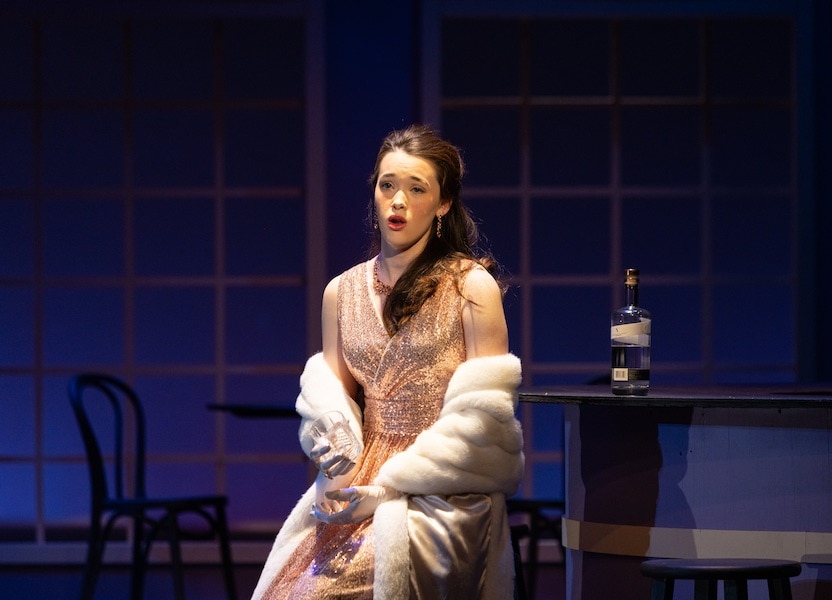Serse is the Italian interpretation of the name Xerxes, the king of Persia 486–465 BCE. The strongest image I have about the king of Persia is the “Babylonian” sequence in D. W. Griffith’s 1916 silent film Intolerance in which reverent and lavishly costumed celebrants dance stiffly down the steps of the most massive set that had been built for a movie up until that time.
The 1738 opera Serse by George Frideric Handel is an ancient, reliable comedy plot in which pairs of siblings are frustrated in love both by their own foolishness and by forces outside of their control. The story doesn’t have anything to do with the historical king of Persia. Thankfully, in the production I saw at Catholic University, Stage Director James Hampton has enthusiastically embraced that theatrical truth and updated the already loosely conceived story of Serse and moved it to the United States of America — Las Vegas, in fact — in our present era of wealth inequality, greed, and power-wielding. The result is a glittering, effervescent, and hilarious concoction that is surprising and delightful at every turn.

The central characters are Romilda and Arsamene. Their romance is the central one that others in the play are trying to disrupt. The next pair are Serse and Amastre. These two are engaged, but Serse’s affections are wavering and Amastre, in partnership with a local wedding planner, is spying on him in order to uncover and eliminate the obstacles to their romance. The third pair are Elviro and Atalanta. These two are related to each other only through their associations with the other characters. Romilda and Atalanta are sisters. Arsamene and Serse are brothers. Elviro and Arsamene are buddies. Serse wants to marry Romilda. Atalanta wants to marry Serse. And Elvis makes an appearance. Or two. I got a little (pleasantly) confused at this point. When the curtain rises, we see a luxurious hotel entrance/bar, that’s like a combination of the 1930s Ginger Rogers/Fred Astaire musicals and Wes Anderson’s Grand Budapest Hotel. The set design is by Brigid K. Burge. In the upstage area are elegant crosshatch windows and doors that simultaneously reveal and hide characters as they approach the center of the action.
At the center of this set is a tree. For those who know this opera, this is the “plane tree” to which the title character Serse sings the first aria. But the leaves look more like the fruit of one of the enterprises that have brought Serse his wealth. (Having perpetrated one spoiler, I will do my best not to give up anymore.) I remember thinking, “Oh, this is where that song ‘Ombra Mai Fu’ comes from!” The song is part of everybody’s classical music 101 course. Here it is given an ironic and motivic context that enlivens its interest and relieves the audience from having to be reverent about a song to a tree that has hard-to-trace Socratic references.
Some of the staging, with characters popping up from behind furniture and hiding behind the frames of windows and doorways, emphasized the visual connection to Grand Budapest Hotel.
The primary function of these productions is to offer opportunities for students to explore the canon they will be expected to know as they pursue their careers and to display and hone the skills that have been working on. While the performers displayed differing levels of operatic skill at this point in their training, all of the performers were committed to their characters. That is a tribute not only to the performers’ skills but also to the director’s skill in making everybody comfortable enough to courageously do work in such an exposed arena. And because of this effort, the audience was deeply engaged in what the performers were doing.

Some of the performers that stood out to me from the Thursday/Saturday cast include Lin Gong as Romilda and Catholic University faculty member Gustavo Ahualli as her father, Ariodate. Both were impressive, as they combined solid dramaturgical characterization and vocal facility seamlessly. Yixuan Wang gave an enjoyable and convincing performance as the sassy and meddlesome Atalanta.
In a way, this show is a series of arias, one after the other. Imagine a concert being given for the benefit of a well-deserving charity (or, Sondheim-ishly, “on their own behalf”) in which the featured performers were Aretha Franklin, Whitney Houston, Barbra Streisand, and Maria Callas: all of it held together by a very light comedic plot. That’s the spirit of this show. The staging made use of the music to move those characters on and off the stage after their arias in an almost hypnotic way. There was no awkwardness here. Though

sometimes it was a little hard to know when to applaud: the show is set up to allow us to applaud after every solo. At one time operas had “claques” — groups of people hired to applaud at performances. And I could see where — as part of this university’s portfolio — both students and audience were being educated about the form of a work that was probably written to allow for the practice of such claques and just how that practice might look and feel appropriate.
The costumes by Glenn A. Breed had that air of extravagant and entitled conspicuous consumption that referred back to the lush work of early 20th-century costume designer Erté. The dresses and gloves were drenched with jewels.
Part of the effervescence of this production must be attributable to Simeone Tartaglione’s music direction, which led the performers to render Handel’s runs, trills, and relentlessly major-key compositions with joyful articulation and execution that was sensitive to the dramatic as well as the musical requirements of the piece.
Running Time: Two hours and 15 minutes plus a 15-minute intermission.
Serse plays March 23 to 26, 2023, produced by The Catholic University of America Benjamin T. Rome School of Music, Drama, and Art performing at Hartke Theatre, 3801 Harewood Road NE, Washington, DC. Tickets ($10–$20) are available at the box office 202-319-4000 or online.
COVID Safety: The Hartke Theater follows the university-wide guidelines of the Catholic University of America. Face Coverings: In accordance with revised guidance from the CDC and the District’s Department of Health, Catholic University no longer requires masking for most of the campus. The complete COVID guidelines can be found here.
Serse by George Frideric Handel
Stage Direction by James Hampton
Music Direction by Simeone Tartaglione
Assistant Conductor: Noel Nascimento
Assistant Conductor: Daniel Rodrigues Lima
Coach Accompanist: Nicholas Catravas
Principal Coach: Jo Ann Kulesza
Area Head: Sharon Christman
Costume Designer: Glenn A. Breed
Lighting Designer: Paul Callahan
Set Designer: Bridgid K. Burge
CAST
Thursday/Saturday
Serse: Samuel Thompson
Arsamene: Yihan Ye
Elviro: Daniel Campbell
Romilda: Lin Gong
Atalanta: Yixuan Wang
Amastre: Dierr Hu
Ariodate: Gustavo Ahualli
Serse’s Assistants: Katherine Blobner, Neely Shah
Local Wedding Planner: Sophia Spencer
Amastre Cover: Aixi Li
Romilda Cover: Katherine Mackenzie
Supernumerary 1 Serse: Neely Shah
Supernumerary 2 Serse: Katherine Blobner
Supernumerary 3 Amastre: Sophia Spencer
Friday/Sunday
Serse: Jiayong Mei
Arsamene: Ethan Nott
Elviro: Linsen Yang
Romilda: Isabel O’Hagan
Atalanta: Nora Spring
Amastre: Ziwei Lin
Ariodate: Joey Chee
Serse’s Assistants: Katherine Blobner, Neely Shah
Local Wedding Planner: Sophia Spencer
Amastre Cover: Aixi Li
Romilda Cover: Katherine Mackenzie
Supernumerary 1 Serse: Neely Shah
Supernumerary 2 Serse: Katherine Blobner
Supernumerary 3 Amastre: Sophia Spencer
ORCHESTRA
Violin 1: Yun Kan co-CM, Carolina Pedroza co-CM, Leah Krieger, Audrey Clement, Hannah Gerdes. Violin 2: Yun Kang, Carolina Pedroza co-CM, Chelsea Loh, Shu-Tin Yao. Viola: Faith Foster, Rizwan. Cello: Chiara Pappalardo P, David Zelinsky. Flute: Sabatino Seirri P, Metthew Sie. Oboe: Daniel Bates P, Sash Jernakoff. Trumpet: James Alleva




